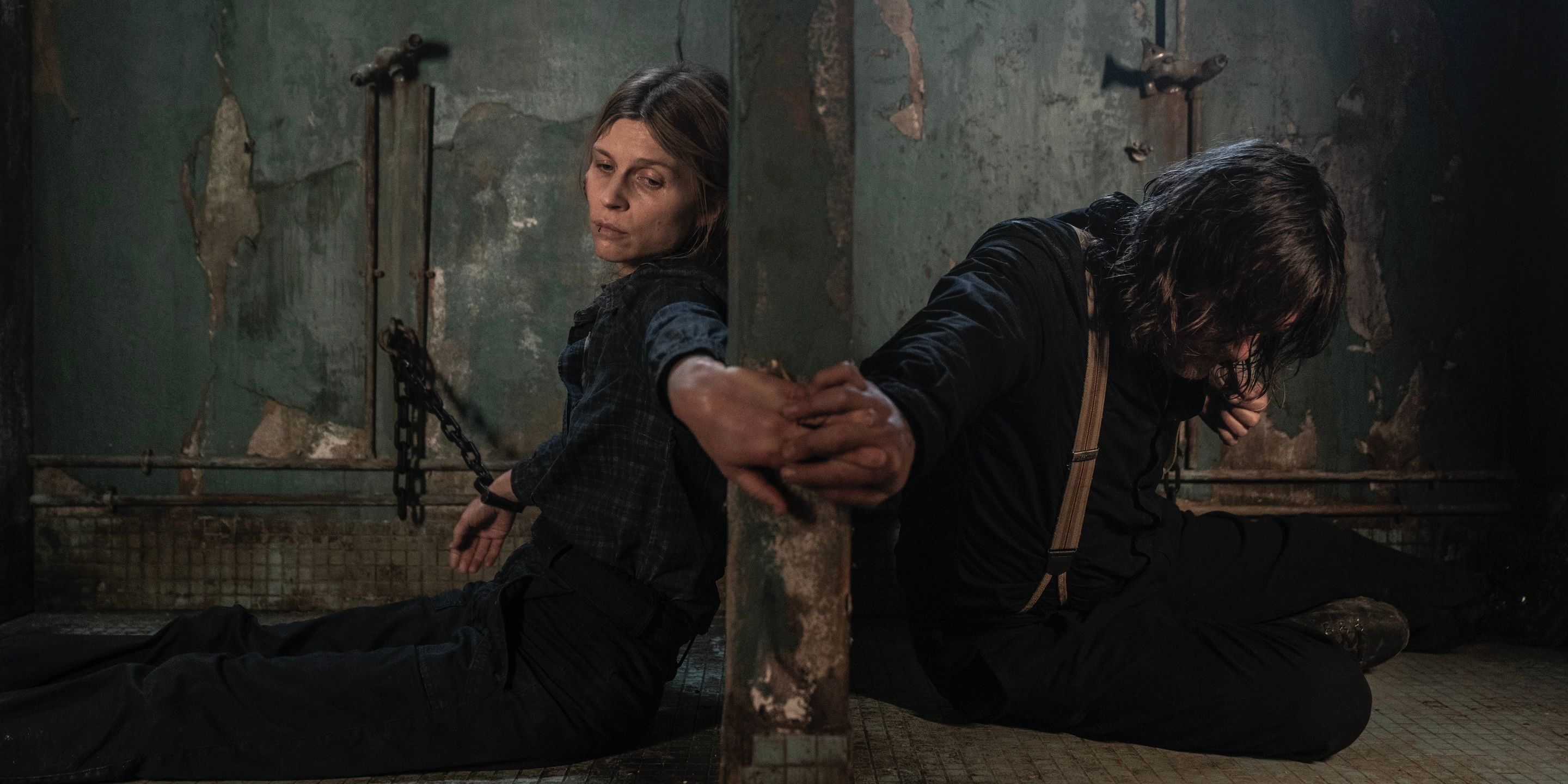
The following contains spoilers for The Walking Dead: Daryl Dixon Season 2, Episode 4, “La Paradis Pour Toi,” which premiered Sunday, Oct. 20 on AMC. It also mentions violence and sexual assault.
The Walking Dead has a funny history with how it treats its female characters. The first two seasons of the main show upheld gendered roles in the apocalypse to “provide stability.” Women did the cooking and cleaning, while men did the hunting and killing. But when women escaped those boundaries, they were chastised for it. It wasn’t until Season 3 that it became more acceptable for women to push gender expectations in an apocalyptic setting. However, The Walking Dead has fallen back into more problematic tropes in recent years with its spinoffs, notably when it comes to Isabelle on Daryl Dixon.
Throughout the first season of The Walking Dead: Daryl Dixon, Isabelle was a laudable companion to the titular character. She didn’t have stereotypical traits that made her an archetype. She could be both strong and vulnerable, with a messy past that encouraged her to build a better future. Isabelle was a natural, realistic female character that could be seen in real life. But something shifted in the second season. Daryl Dixon pushed her to the background until she was eventually boxed into the role of a romantic interest. Her sudden loss of nuance was strange, given her importance to the story. That is until “La Paradis Pour Toi,” when she’s killed by Losang after attacking him. Isabelle’s unanticipated death came just after her romance with Daryl and the arrival of Carol, revealing her only purpose was to be a temporary motive for Daryl’s arc.
Was Isabelle Fridged on The Walking Dead: Daryl Dixon?

“Fridging” comes from the term “women in refrigerators,” which was coined by writer Gail Simone in 1999.
The term refers to female characters being harmed, assaulted or killed as a motivating incident for male characters.
Fridging was named after an incident in Green Lantern Vol. 3 #54, where the title hero finds his girlfriend, Alexandra DeWitt, dead and stuffed in a refrigerator.
There’s an actual term used to describe Isabelle’s predicament: “fridging,” which would make Isabelle a “woman in a refrigerator.” The harmful trope is repeatedly used in different mediums of storytelling, as a way to fuel a male character’s actions through the death of a woman they were close to. Comic books and their adaptations are the biggest perpetrators of fridging because, more often than not, the male superhero experiences the death of a girlfriend or female parental figure to become the hero. But comics aren’t the only medium that utilize the trope.
Christopher Nolan’s movies often feature a female supporting character who dies, traumatizing the male protagonist but giving them a reason to complete their mission. Another trait of fridging is the exaggerated violence against female characters for shock value. While men are more likely to get heroic and sensitive deaths, women are given more traumatic deaths brought upon by sexual assault, casual wounds or torture.
For an excellent case in point, Daryl Dixon‘s Quinn died a hero by sacrificing himself to buy Daryl time to escape, despite only being a prime example of toxic masculinity in the previous episode. On the other hand, Isabelle is stabbed by a cult leader who tried to kill her nephew and drags herself across the Nest in agonizing pain. She was only “allowed” to die when Daryl found her and had his final moment with her, fueling his anger against the Union of Hope for forcing him to experience another death. Later, Daryl implicitly acknowledges that Isabelle’s death is the reason why he’s shutting himself off again.
Daryl initially doesn’t want to take Laurent to America because he’s worried Laurent will die like Isabelle. But he also wants to fulfill her final wish of Daryl taking care of Laurent, so her death emotionally compels him to do so. It’s similar to Tess’ last request for Joel on The Last of Us — both men likely wouldn’t go through all this trouble to look after this child if the woman they cared about didn’t die. Like Tess with Joel, Isabelle was just meant to crack at Daryl’s hardened shell.
Isabelle Was Killed to Leave Space for Carol
The problem with Isabelle’s death doesn’t stop at fridging. It continues with the idea that Daryl cannot be close to two female characters at once, a bizarre notion that previously didn’t exist in The Walking Dead. Before, Daryl was close to Carol, but also had friendships with Beth, Connie and Maggie. Even when Beth died, it wasn’t rooted in a need to “throw out” the other female characters in Daryl’s circle.
Beth’s death was simply a circumstance of a horrible situation in the apocalypse. But with a tighter cast on The Walking Dead: Daryl Dixon, the timing of Isabelle’s death is sketchier. Not even minutes after Daryl and Carol reunite, Isabelle dies. Even if the writers didn’t intend for there to be a “shipping war” between Carol and Isabelle, there is a message: Daryl always needs a female companion, but never two. If there are two female companions, it becomes a toxic whirlpool the show can’t escape from.
The purpose behind timing Isabelle’s death upon the reunion could be that the writers wanted to avoid a ship war in the first place. Fans of The Walking Dead have become more toxic every year, attacking one another over their preferred ship in the franchise. Perhaps the writers didn’t want to deal with the unintentional “competition” that fans would’ve created between Isabelle and Carol.
Ultimately, the fans would’ve nitpicked every scene they had together to argue which one would be the better romantic partner for Daryl. As if Disney and Lucasfilm listening to misogynistic, racist fans to cancel The Acolyte was bad enough, Daryl Dixon eliminated any opportunity for two fantastic female characters to have a dynamic together — one that didn’t involve a man in the middle.
‘La Paradis Pour Toi’s’ Tone Doesn’t Match a Time for Mourning

As if Isabelle’s death couldn’t get any weirder, most of the remaining chunk of “La Paradis Pour Toi” likes to pretend it didn’t happen. Realistically, it makes sense why Daryl and Carol have to move past her death so quickly. She died in the middle of a battle where their lives were still at risk. But once they reached safety, the tone shifted sporadically. Daryl and Carol were no longer uprooted by Isabelle’s death.
The atmosphere lightened up, and suddenly the characters were placed in a domestic environment where they played house for a day or two. Daryl is the type of guy to shut off and bury his emotions when something traumatic happens, but Daryl Dixon‘s change in mood suggests that Isabelle wasn’t worth mourning for a suitable amount of time. Nearly 15 years into The Walking Dead franchise, it’s hard to watch it revert into the bad habit of fridging.
Some of the best characters to come out of the main show and spinoffs are women: Michonne, Maggie Rhee and Alicia Clark, just to name a few. These characters were developed without the need to uphold societal expectations that women are born to serve men. But by fridging Isabelle, The Walking Dead goes right back to square one. She becomes another female character designed as a plot device for a man’s story, making her just another woman in a crowded refrigerator.
New episodes of The Walking Dead: Daryl Dixon air every Sunday at 9:00 PM ET on AMC and AMC+.




